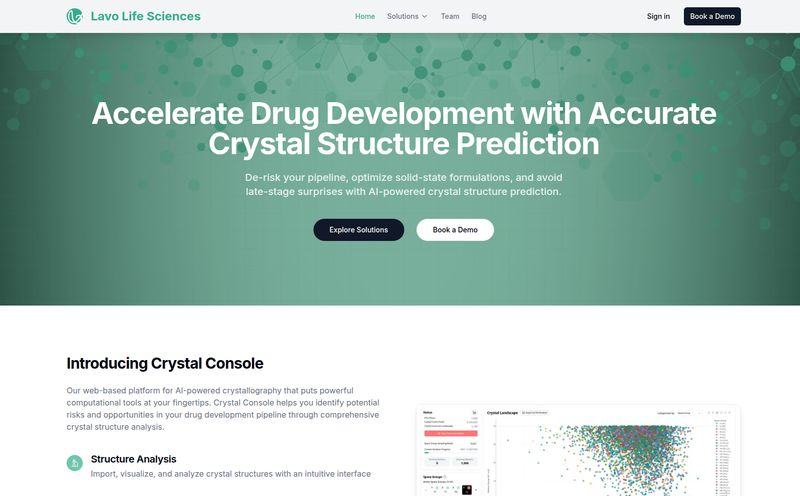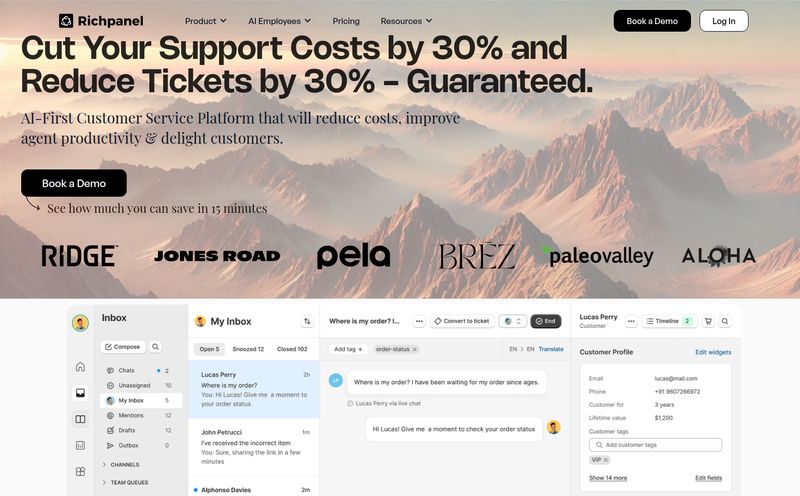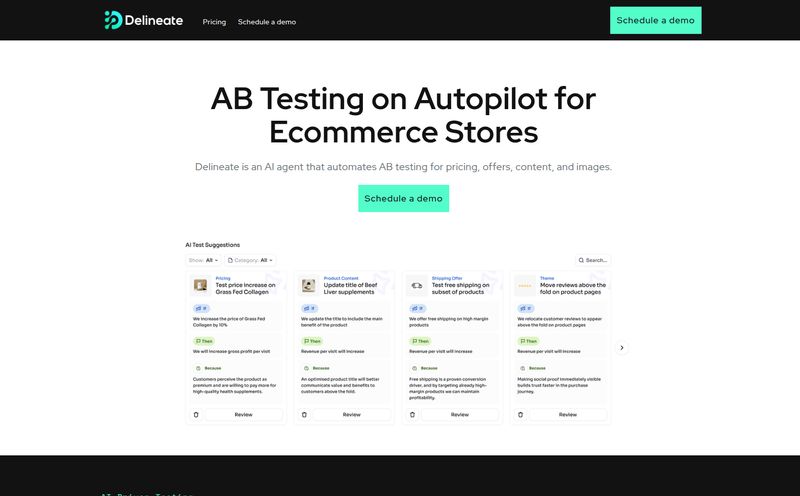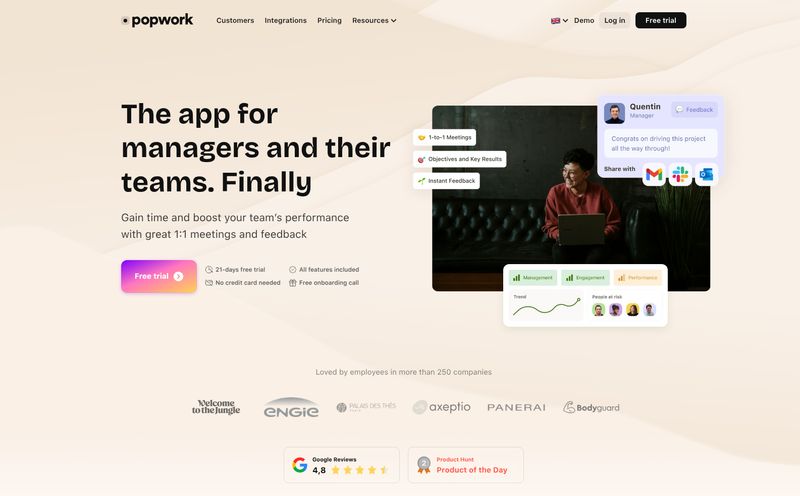The early days of a startup are a special kind of chaotic. It's a dizzying mix of exhilarating highs and stomach-churning lows, fueled by too much coffee and the nagging question, “Am I completely crazy for doing this?” We’ve all been there, staring at a notebook filled with ideas, trying to pick the one that won’t end in a spectacular flameout. It's a lonely road.
For years, founders have looked for patterns, for some kind of template for success. We study the greats. We read the Paul Graham essays. We religiously follow the announcements from accelerators like Y Combinator, trying to reverse-engineer their magic. What if you could get a peek behind that curtain? What if you could use their data to pressure-test your own idea before you write a single line of code?
That's the massive promise of a new tool that landed on my radar: YCLens. It’s a bold claim. A very bold claim. But in a world drowning in half-baked ideas and 'build it and they will come' fantasies, maybe a dose of data-driven reality is exactly what the doctor ordered. So, I decided to pop the hood and see what this thing is really all about.
So What is YCLens, Really?
At its core, YCLens positions itself as a founder's co-pilot, designed to help you build a better startup by using success patterns from the one and only YC Combinator. Think of it less as a simple software tool and more like a data-driven compass. It’s built on the idea that success leaves clues, and that by analyzing the DNA of hundreds of successful YC companies, you can make smarter, more informed decisions for your own venture.
It's not just some random app, either. It comes from the folks at EO Studio, a venture studio that builds and launches new companies. This gives it a bit more weight in my book; it’s built by people who are in the trenches, not just commenting from the sidelines. The platform seems to stand on four main pillars: brainstorming and validation, checking market potential, planning for profit, and getting community feedback.
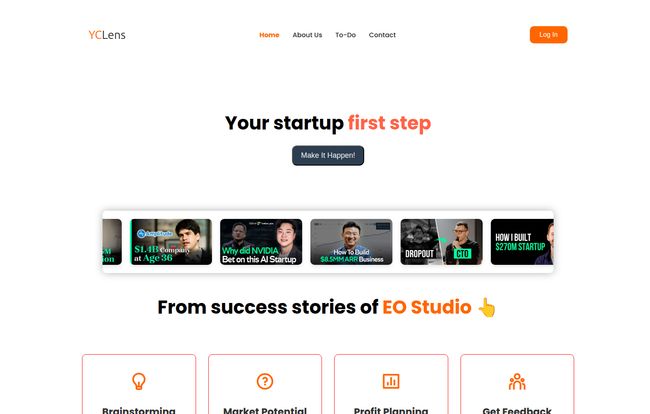
Visit YCLens
A Closer Look at the Core Features
Okay, the high-level pitch sounds great. But as we all know, the devil is in the details. What does YCLens actually do? Let's break down its main promises.
Instant Validation for Your Next Big Idea
There is no greater pain for a founder than spending six months and all your savings building something nobody wants. It’s a classic, tragic story. YCLens aims to be your first line of defense against this fate. By comparing your SaaS idea against a backdrop of established market data and successful company patterns, it gives you an initial reality check. Is there a signal here? Or are you shouting into the void? I've personally had a project or two in my past that could have benefited immensely from a dose of this kind of impersonal, data-backed feedback early on.
Gauging Your Market Potential
“This idea is huge!” Every founder says it. But “huge” isn’t a number that impresses investors, or pays the bills. YCLens claims to help you get beyond gut feelings with concrete market analysis. This means getting a better handle on your target market and the competitive scene. While the site is a bit vague on the specifics, a proper tool here would help you understand the difference between your total addressable market and the tiny slice you can realistically capture. That’s a conversation that moves you from dreamer to business builder.
Planning for Profit, Not Just Passion
Passion is the fuel, but profit is the engine. YCLens dangles a very juicy carrot here: insights from over 1,000 case studies to help you plan your profit strategy. This is fascinating. Are they analyzing pricing models? Go-to-market strategies? Customer acquisition costs of successful YC companies? Seeing how others have successfully monetized similar ideas can be incredibly powerful. It helps you avoid reinventing the wheel and instead focus on building a sustainable business from day one.
The Power of the Pack and The YCLens Community
This might be the most underrated part of the whole thing. Building a startup can be isolating. You’re facing problems that your friends and family just don’t understand. YCLens isn’t just selling software; they’re building a community. They mention exclusive Discord access, which is a fantastic move. A dedicated space to connect with other founders, share war stories, and get feedback on your ideas is, frankly, invaluable.
The platform calls itself a “lifelong partner in innovation.” That’s a bit of marketing fluff, sure, but the sentiment is right. The journey is long, and having a peer group to share it with makes a world of difference. This is where you can get the kind of feedback that a data-sheet can't provide.
So, What's the Catch? A Frank Discussion
Alright, let's get real. No tool is perfect. As an SEO and traffic guy, I'm naturally skeptical. Based on the info available and my own experience, here are a few things to keep in mind.
First, the classic data problem: garbage in, garbage out. The tool's effectiveness is completely dependent on the quality and relevance of its data. How fresh is it? How do they interpret YC's "success patterns"? This is the black box we have to trust. Second, community feedback is a double-edged sword. While amazing, it can also be a source of noise and bad advice. Learning to filter feedback is a skill every founder must learn. Not every opinion is created equal.
And then there's the question of price. I went looking for the pricing page to see what this would set a bootstrapped founder back, and… well, I hit a 404 page. It seems to have “disappeared into the digital void,” as their cute error message says. This isnt necessarily a red flag. It often means a product is in a private beta, or the team is still finalizing its pricing tiers. My guess? We'll probably see a freemium model to get people in the door, with paid tiers for deeper analysis and more community perks. For now, it seems you can join a mailing list to stay in the loop.
Who is YCLens Actually For?
So who should be hitting that "Join Our Community" button?
- The Aspiring Solo Founder: You have a dozen ideas scribbled in a notebook and need a way to screen them for potential without bias.
- The Early-Stage Team: You've settled on an idea but want to de-risk it as much as possible before committing your team's precious time and energy.
- The Non-Technical Founder: You have a vision but need data to back it up when talking to potential co-founders, developers, or early investors.
It’s probably not for established companies or those just looking for a simple project management tool. This is a tool for the very beginning of the startup process—the first, crucial step.
Final Thoughts From a Fellow Grinder
I have to say, I'm intrigued by YCLens. The core idea is incredibly strong. The startup world is littered with the ghosts of good ideas that had bad execution or poor timing. A tool that provides a data-driven sanity check is something the ecosystem desperately needs. The link to YC's data is a brilliant marketing hook and a potentially powerful feature.
The success of YCLens will hinge on its execution. How good is the data? How insightful is the analysis? How vibrant and helpful will the community be? These are the open questions. But the concept alone is a step in the right direction. It's a tool I've signed up for, and I'm genuinely curious to see how it develops. In the lonely, uncertain world of startups, a good compass is worth its weight in gold.
Frequently Asked Questions about YCLens
Is YCLens officially affiliated with YC Combinator?
From what I can tell, no. It appears to be an independent product from EO Studio that uses publicly available data and analyses patterns from YC's successful companies. It’s not an official YC product itself.
How much does YCLens cost?
That's the million-dollar question! The pricing page is not currently live, which suggests it might be in a closed beta or the pricing structure is still being decided. Your best bet is to join their community or email list for updates.
What kind of data does YCLens use for its analysis?
The platform claims to use data from over 1,000+ case studies, patterns from YC Combinator's portfolio, and competitive market analysis. The exact sources and depth of this data aren't fully detailed yet.
Can I use YCLens for a startup that isn't a SaaS company?
The language on the site seems heavily focused on SaaS (Software as a Service) ideas. However, the core principles of idea validation, market analysis, and profit planning are universal. It could still offer value for other types of tech or tech-enabled businesses.
Is the community feedback any good?
Like any open community, the quality will likely vary. The value will come from connecting with other founders on a similar path. The key is to be an active participant and learn to distinguish constructive criticism from random noise.
